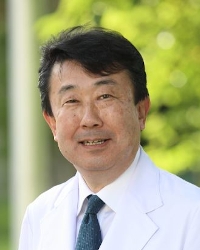Division and Department
Department of Medical Education

Hitoshi HASEGAWA, MD, PhD, FACP
A Greeting from the Professor
“All For Patients”
Medical education must be reformed one or two steps in advance—in anticipation of future needs and medical care development—to adequately serve society, especially during the present era of data deluge and medical information “explosion.”
Welcome! Thank you for visiting our department’s homepage.
Our department was established in 2013 to promote ideal medical education and reform it in tandem with all departments and instructors in the university, and with external institutions and professionals, as well as with our students, who will lead our efforts in the future. With the cooperation of our colleagues in all fields, we are dedicated to providing our students with high-quality, evidence-based, learner-centered medical education and training, to help them master the art and science of medicine and become ideal doctors—healers, innovators, medical teachers and leaders—with international perspectives and a global vision. We aim to ensure that, by the end of our six-year program, all students have come to fully understand the following subject areas and acquired the relevant knowledge and skills for each, thus preparing them to function as ideal clinical residents, and later as physicians.
- Professionalism
- Medical ethics
- Medical behavioral science
- Patent safety
- Evidence-based medicine (EBM)
- Medical laws
- Communication skills
We prepare our students to perform the basic clinical skills (clinical reasoning—medical interview, physical assessment, writing medical records—for primary and general practice) for 41 major symptoms.
We strive to ensure the excellence of our educational program, through:
- designing and coordinating an integrated curriculum with all instructors and students of our university, and with related hospitals and clinics
- supporting teachers, and students in the process of teaching and learning
- maintaining up-to-date, accessible, and appropriate facilities and resources for education
The main duties of our department include:
- promoting continuous curriculum reform for the future, together with faculties and students
- promoting education digitization (lectures, practice, training, evaluation) in tandem with related divisions to realize more effective lectures and practical training in which students become active learners
- managing the unified term-end examination, first, fourth, and sixth grade Objective Structured Clinical Examinations (OSCE), and the Computer Based Test (CBT) for the fourth-year students
- arranging lectures horizontally and vertically to promote integrated education, linked to every field in each school year
Our department focuses strongly on educating our first-year students. Based on clinical reasoning learning and training for major symptoms, we pursue a horizontally and vertically integrated basic, social, and clinical medicine education approach extending through their entire six years of medical school. Medical information science informs our medical interview practice educational regimen, which is adjusted for various situations. We also supplement our medical English education by teaching medical interview skills and medical anthropology in English, and conduct OSCE in English annually.
For our second-year students, we provide courses on integrated community care systems and inter-professional education that center on problem-based learning (PBL), with the cooperation of many different medical professionals.
For our fourth-year students, we coordinate pre-clinical clerkship basic clinical skill lectures and practical training. Additionally, for students engaged in clinical clerkships we coordinate weekly symptom-based conferences and perform major symptom-based simulation training. Finally, for all levels of our medical education program, we conduct research to assess learner and program outcomes for continuous quality improvement.
Staff
Professor:
Hitoshi HASEGAWA, MD, PhD, FACP
Associate Professor:
Donald C. WOOD, PhD
Research Areas
- Six-year curriculum unification and performance evaluation
- The promotion of a continuous medical education system
- The influence of prior performance evaluation on clinical reasoning learning
- Prior online simulation training effects on interprofessional education
- The impacts of medical English education on medical students
- Medical anthropology education as part of a medical English regimen
- The society, culture, and history of Akita Prefecture and the Tōhoku region
- Economic anthropology, medical anthropology, ethnology / folklore studies
Contact Information
Professor: Hitoshi HASEGAWA
Phone: +81-18-884-6097
E-mail: hasegawa@doc.med.akita-u.ac.jp
Most Recent Achievements
- Toyoshima M, Takenoshita S,Hasegawa H, Kimura T, Nomura K. 2020. Experiences of Negotiations for Improving Research Environment and Burnout among Young Physician Researchers in Japan. Int. J. Environ. Res. Public Health, 17, 5221; doi:10.3390/ijerph17145221
- Wood, D.C. 2022. Infrastructure, Morality, Food and Clothing, and New Developments in Latin America. Research in Economic Anthropology, Volume 41. Bingley, UK: Emerald Group Publishing.
- Wood, D.C. 2020. Civic Resistance to Japanese Militarism. New Politics, 52(4): 20-26. (https://newpol.org/issue_post/civic-resistance-to-japanese-militarism/)
- Wood, D.C. 2020. Anthropological Enquiries into Policy, Debt, Business and Capitalism. Research in Economic Anthropology, Volume 40. Bingley, UK: Emerald Group Publishing.
- Wood, D.C. 2019. Individual and Social Adaptions to Human Vulnerability. Research in Economic Anthropology, Volume 38. Bingley, UK: Emerald Group Publishing.
- Wood, D.C. 2019. Japan’s Wartime Past Looms Large Over Militarization Efforts:
A community's memories are shaping its resistance to the Japanese government's plan to build a new defensive missile system. Sapiens (March 21).
(https://www.sapiens.org/culture/japan-military-akita/) - Wood, D.C. 2018. Disease is Always Cultural: Medical Anthropology for Future Physicians at Akita University. Journal of Medical English Education, 17(1): 50-58.
- Wood, D.C. 2018. Teaching Medical Anthropology to Future Physicians: Content-based EMP for Cultural Competence, Critical Thinking, and Cosmopolitanism. Journal of Medical English Education, 17(3): 139-142.
- Wood, D.C. 2018. Shiraiwa-yaki Reborn: Reinventing a lost Edo-period Pottery Tradition in Kakunodate, Akita Prefecture. Kyoto Journal, 91 (https://kyotojournal.org/online-special/shiraiwa-yaki-reborn/).
- Wood, D.C. 2017. Photography in the 1930s “Native” Ethnography of Yoshida Saburō: The Eye of the Seikatsu-sha and the Legacy of Shibusawa Keizō’s Attic Museum. Japanese Review of Cultural Anthropology, 18(1):37-68. (https://www.jstage.jst.go.jp/article/jrca/18/1/18_37/_article/-char/en)
- Wood, D.C. 2017. Anthropological Considerations of Production, Exchange, Vending and Tourism in Asia, Africa, Oceania and the Americas. Research in Economic Anthropology, Volume 37. Bingley, UK: Emerald Group Publishing.




